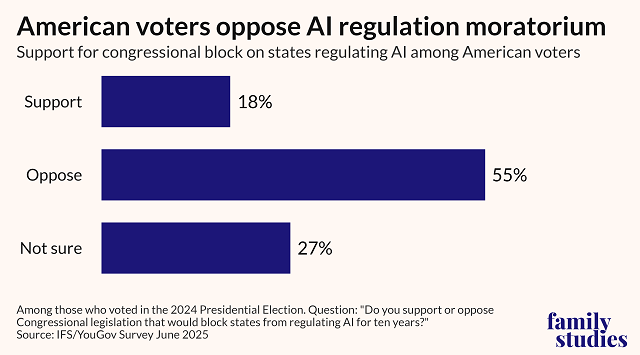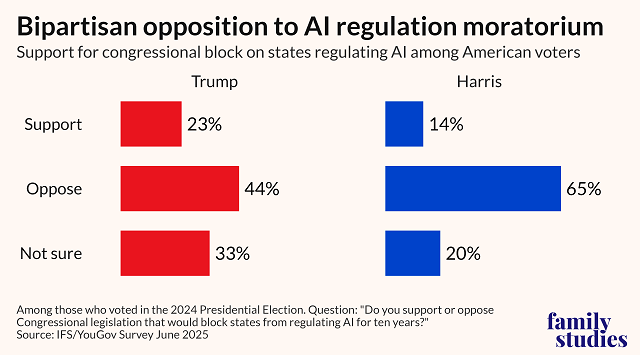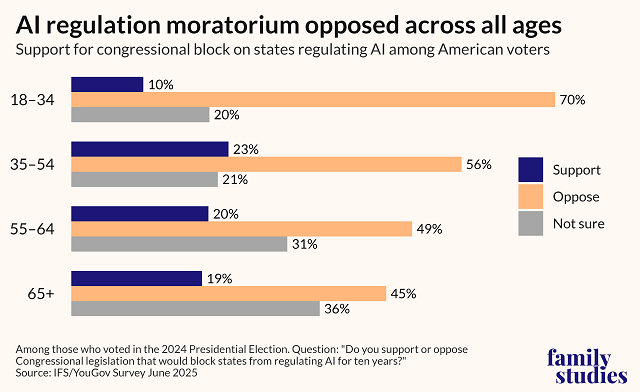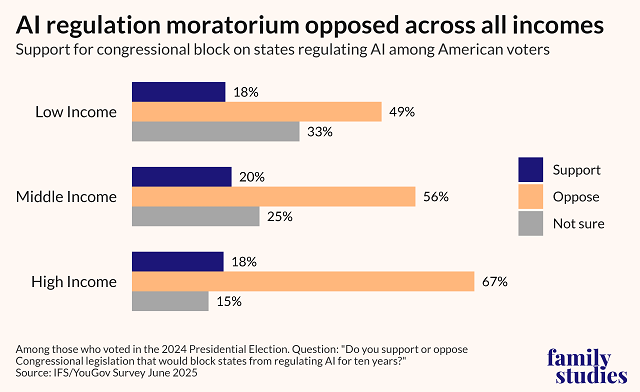Highlights
When the One Big Beautiful Bill Act passed the House on May 22, 2025, Americans were unaware that it contained a provision that would block and void state regulation of artificial intelligence (AI) for ten years, i.e., the so-called AI moratorium. The bill language of the Senate version is being continually modulated to gain more support. The current version allows states the “choice” to regulate AI, but on the pain of forfeiting access to federal funding for broadband, as well as funding for AI implementation.
Supporters of the provision argue that it is critical to our geopolitical contest with China that we develop A.I. with the greatest speed and least constraint, and that overregulation by the states could hamper the technology’s critical development. They also argue that the federal government will eventually provide comprehensive guidance for the regulation of AI that will preempt the states, rendering state legislation unnecessary at best, and harmful at worst.
Some, like scholars at IFS, have criticized the provision, even in its latest form, for “failing to protect children and families from predatory uses of emerging technology.” The moratorium, for instance, would block a law in Utah that bars mental health chatbots from soliciting users with advertisements, a law that disincentivize companies from exploiting their suffering consumers. The moratorium would bar several laws nationwide that require so-called “AI companions”—as Big Tech has branded them—to clearly disclose that they are not human beings. And it would sweep away numerous laws, in blue and red states, that prohibit the use of AI to generate pornographic deepfakes, including that of child pornography. This short count just skims the surface of the many laws in states that are at high-risk of nullification (or blockage) that are designed to protect children, families, consumers, workers, and voters from predatory and anti-social uses of AI.
But, here, our aim is not to litigate these arguments. Rather, in this piece, we are simply asking American voters what they think.
In a recent survey with YouGov, the Institute for Family Studies polled 763 Americans that voted in 2024 on whether they support the AI moratorium or not.1 This is what we found:
The majority of American voters oppose the AI moratorium by a margin of 3 to 1. 55% oppose the provision, versus 18% who support, and 27% who are unsure. Indeed, the most popular response was “strongly oppose” at 36% of voters, followed by “not sure” (27%), “somewhat oppose” (19%), “somewhat support” (11%), and “strongly support” (7%). In other words, strong support is the most unpopular position of all.

Opposition to the moratorium is bipartisan. More Trump voters and more Harris voters oppose the moratorium than support it. Trump voters oppose the AI moratorium by more than 20 percentage points (though they are more likely than Harris voters to say they are “not sure”).

We broke the overall sample down into four age categories, namely, ages 18-34, 35-54, 55-64, and 65+. In all age categories, more voters oppose the AI moratorium than support it, with younger Americans being the most opposed. In fact, 18–34-year-old voters oppose the moratorium by an incredible margin of more than 7-to-1.

Similarly, the moratorium was unpopular across all income brackets, with only 18% to 20% supporting the position. Lower income American voters were more likely to be “not sure.” Opposition is strongest among middle-income (56%) and high-income American voters (67%).2

Conclusion
The data find that Americans strongly oppose the AI moratorium provision. The opposition is strikingly uniform. It is worth briefly speculating why.
No doubt others could offer many theories to explain this strong feeling that American voters have against the AI regulation moratorium, but here we will present only one. Americans have learned the hard way that emerging technologies bring many benefits, and, simultaneously, they inflict many harms. That’s the story of their lives over the last two decades. Americans don’t want to experience it again, and they think that their elected representatives, including those in the states, have a duty to protect them and their families from predatory and exploitative uses of technology, even as those very same representatives nurture frontier industries. They are asking lawmakers at every level to not forget or sacrifice them, and to learn the fundamental lesson that it is possible—indeed, essential—to protect American industry and American families at the same time.
Michael Toscano is Senior Fellow and Director of the Family First Technology Initiative at the Institute for Family Studies, and a leader in “The Future of the Family” movement.
Grant Bailey is Research Associate at the Institute for Family Studies.
NOTES
1. On June 18, 2025, YouGov and the Institute for Family Studies fielded a survey of a nationally-representative sample of 2024 voters (n= 763) that asks the following question:
Do you support or oppose Congressional legislation that would block states from regulating A.I. for ten years?
Strongly support
Somewhat support
Somewhat oppose
Strongly oppose
Not sure
2. Low-income is defined as a family income of less than $50,000. Middle-income is defined as a family income greater than or equal to $50,000 and less than $120,000. High-income is defined as family income of greater than or equal to $120,000.












